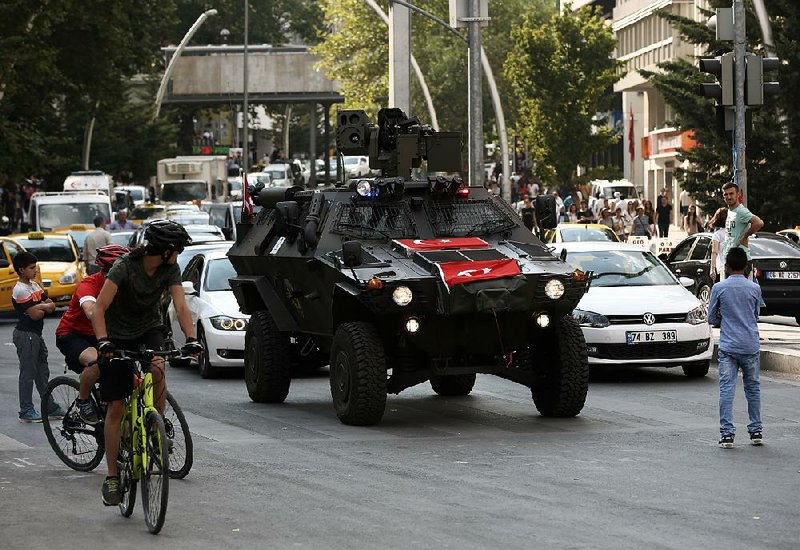ISTANBUL -- A top Turkish official on Friday accused the United States of "standing up for savages" by not immediately handing over a U.S.-based Muslim cleric who the Turkish government claims orchestrated last week's failed coup.
Speaking in Washington, President Barack Obama said there was a legal process for extradition and encouraged Turkey to present evidence.
Turkey said it was dispatching its justice and interior ministers to the United States next week to push for the extradition of the cleric, Fethullah Gulen.
The two NATO countries are allies in the fight against the Islamic State extremist group; U.S. military jets have been flying missions against extremists in Iraq and Syria out of the Turkish air base at Incirlik.
U.S. officials said Friday that electric power was restored to the Incirlik base, which had been operating on a backup generator since July 16, when power was shut off at all military bases in Turkey following the failed coup.
Meanwhile, Turkey's prime minister, Binali Yildirim, warned that coup plotters still at large might stage attacks, saying there is "a remote chance some madmen might take action, acting out of a sense of revenge and defeat."
Turkey has launched a crackdown after the failed July 15 insurrection, declaring a three-month state of emergency and detaining or dismissing tens of thousands of people in the military and other state institutions. In the latest measures, the government revoked nearly 11,000 passports and detained 283 members of the presidential guard, the state-run Anadolu news agency reported.
Turkey alleges that the coup attempt by some military units was conceived by Gulen, who has lived in self-imposed exile in Pennsylvania since the late 1990s. Gulen has denied any prior knowledge of the coup attempt.
Yildirim criticized the United States for failing to hand over the cleric, a former ally of President Recep Tayyip Erdogan.
"Stop standing up for savages who run over citizens with tanks, who strafe people from land and the air," Yildirim said.
In his comments on Friday, Obama said any reports that the United States had previous knowledge of the coup attempt or has been anything other than supportive of Turkey's government are "unequivocally false."
He said he told that to Erdogan in a phone conversation this week. Obama said he also told the Turkish president that any false reports about alleged U.S. knowledge of the coup plot "puts our people at risk on the ground in Turkey and it threatens what is a critical alliance and partnership between the United States and Turkey."
Obama also echoed comments by U.S. Secretary of State John Kerry that Turkey must present evidence if it wants Gulen to be extradited. Erdogan's spokesman, Ibrahim Kalin, has previously said Turkey is preparing a formal extradition but that Gulen "can easily be extradited on grounds of suspicion."
Gulen sought to reassure his followers in a sermon posted on his movement's main website.
"Everyone should stand strong," Gulen said. "Those who kneel in front of God will not kneel in front of anyone else. Even when faced with the death penalty."
He was referring to Erdogan's statement that he would consider calls for the reintroduction of the death penalty for use against the coup plotters.
Erdogan, meanwhile, criticized Gulen in remarks to journalists in Ankara, the Turkish capital, saying "this individual is indecent enough to insult the people from over there" in the United States.
Turkey announced new details about the state of emergency, including extending the period that suspects can be detained without charges to up to a week.
Additionally, civil servants can only travel abroad if they have written approval from their supervisors, the Anadolu agency reported.
Diplomats and most citizens who don't work for the government are not affected by the travel restriction.
Erdogan has said the new powers granted by the state of emergency will counter threats to Turkish democracy.
Germany expressed concern about the rule of law in Turkey, saying photos and television footage indicated that some people detained in the wake of the failed coup appeared to have been mistreated.
The Vienna-based Organization for Security and Cooperation in Europe has asked for access to the trials against alleged coup plotters in Turkey.
The government says 246 pro-government people -- military and civilians -- died during the attempted coup, and at least 24 coup plotters were also killed.
Erdogan has declared July 15 a national holiday to commemorate the people killed by the forces that staged the coup attempt.
Information for this article was contributed by Erol Israfil of The Associated Press.
A Section on 07/23/2016
